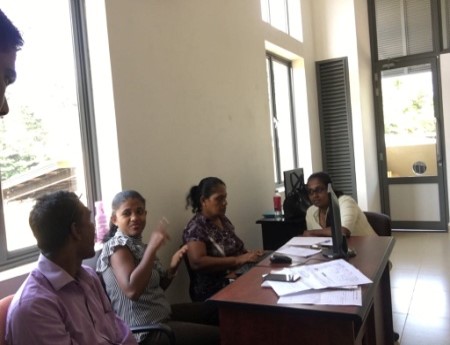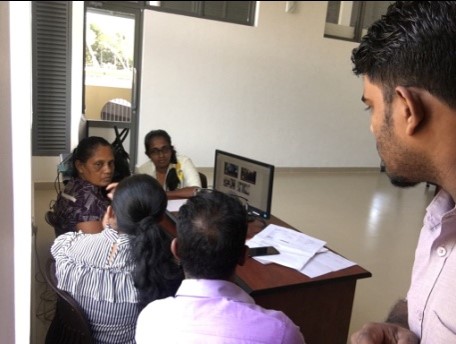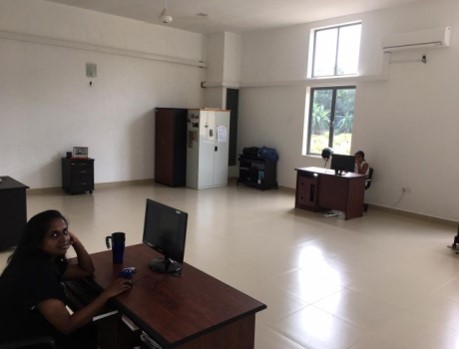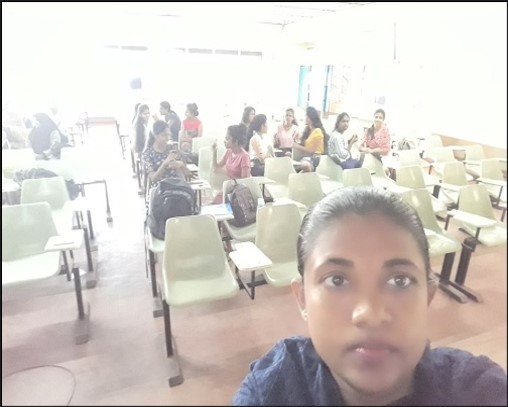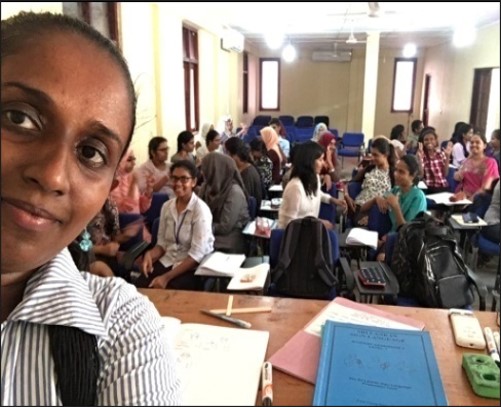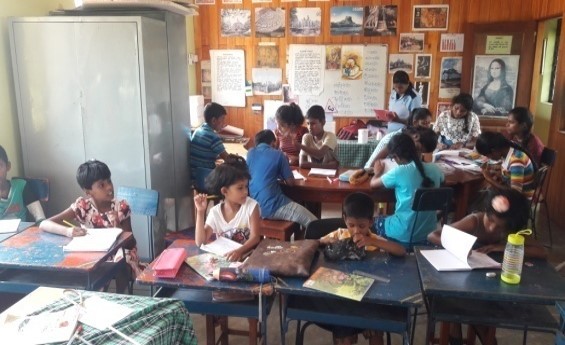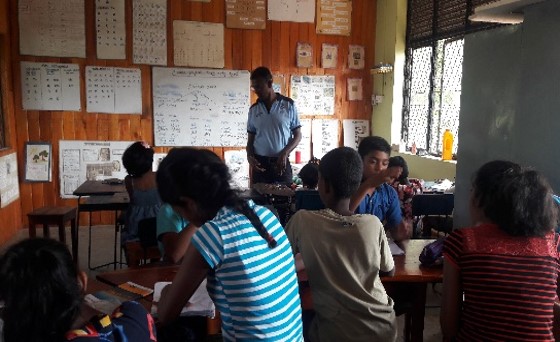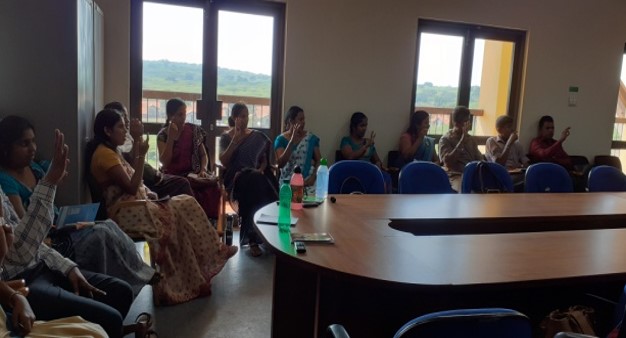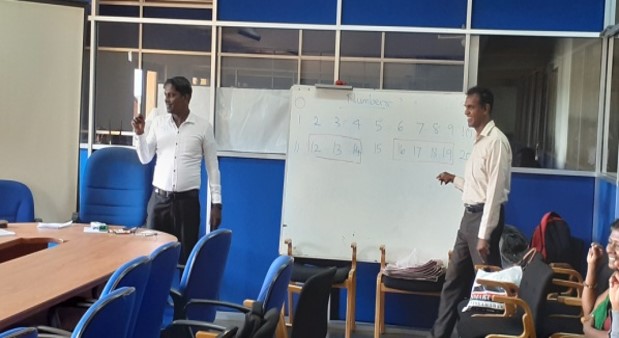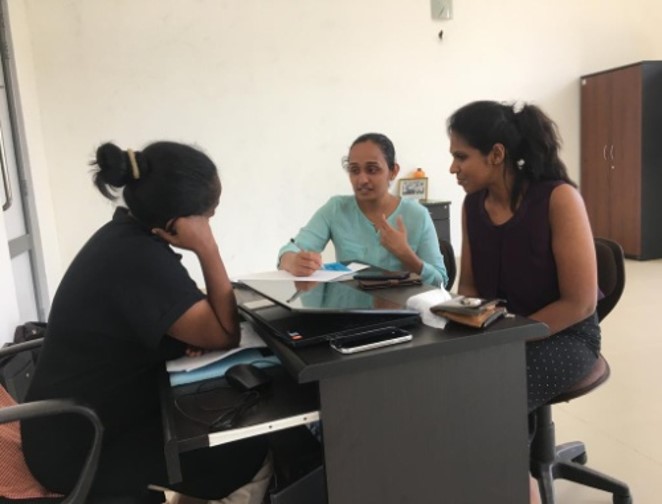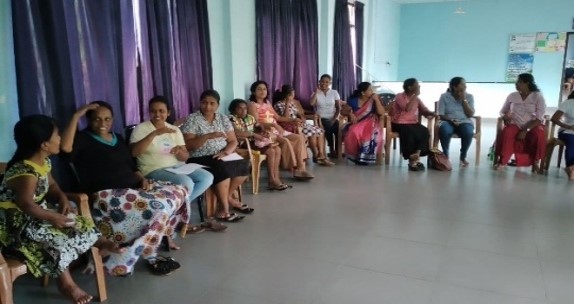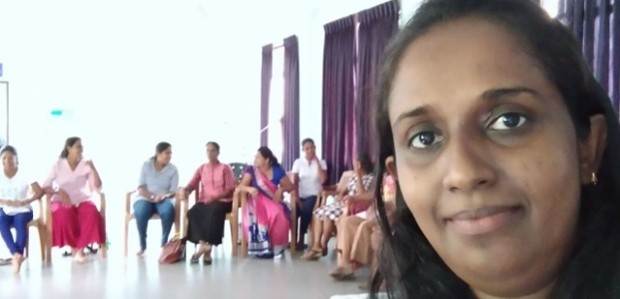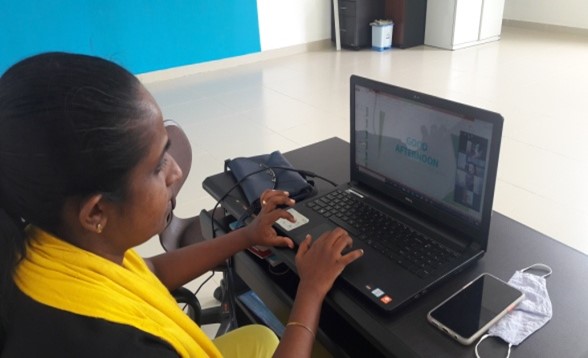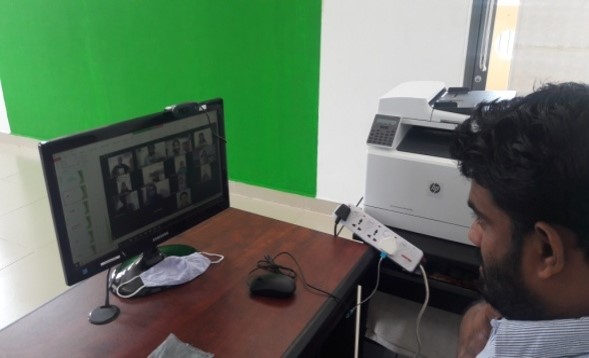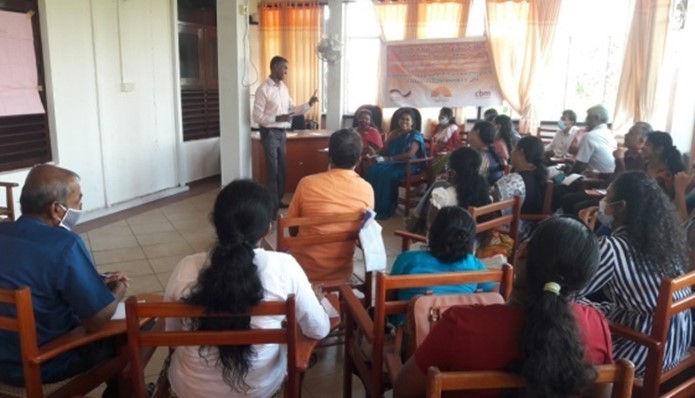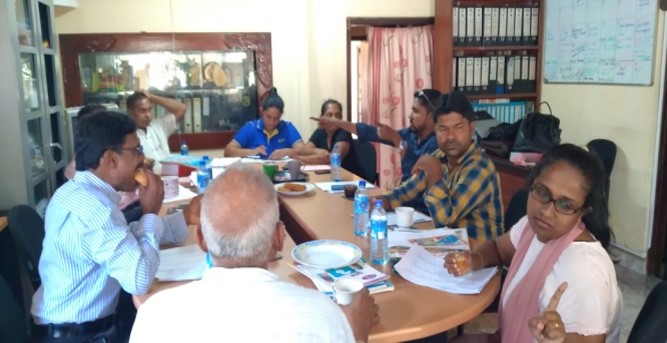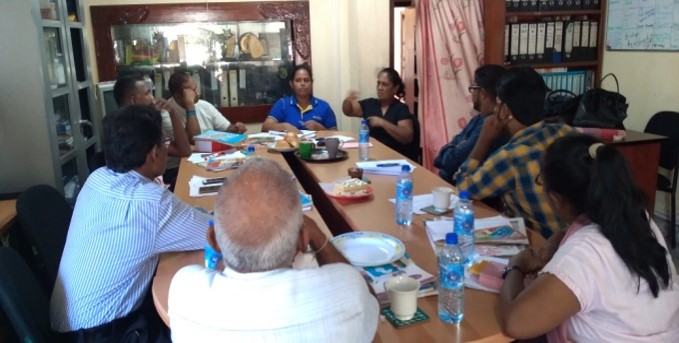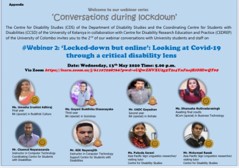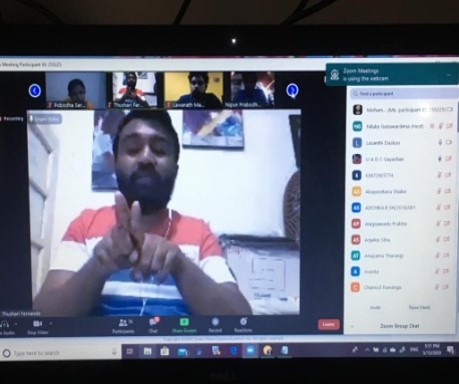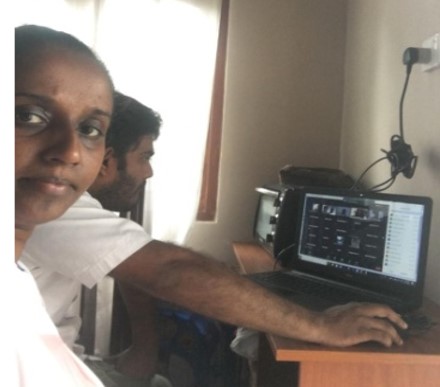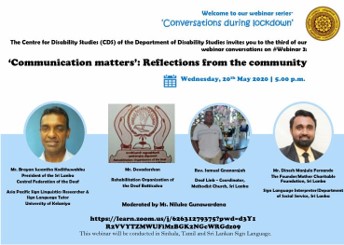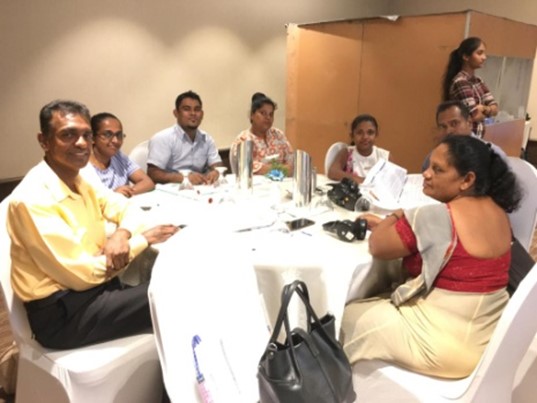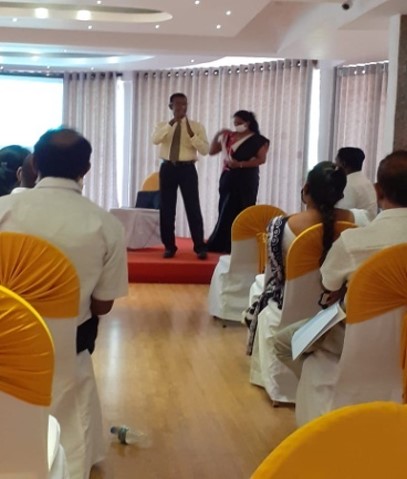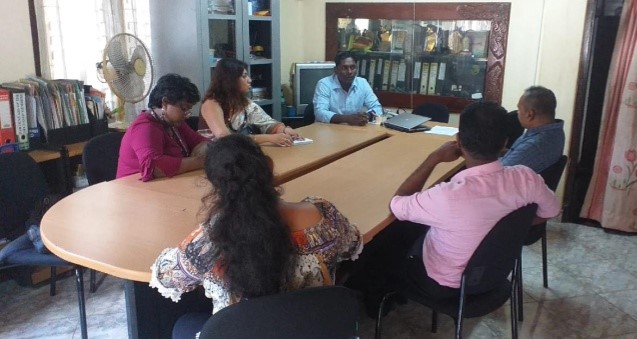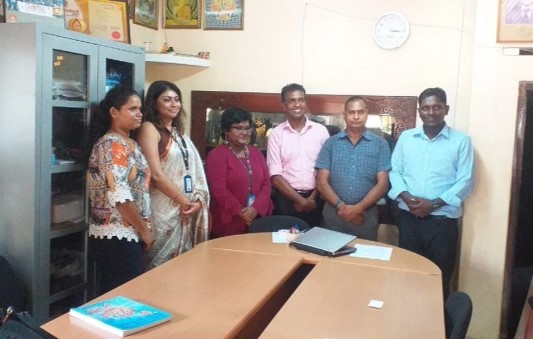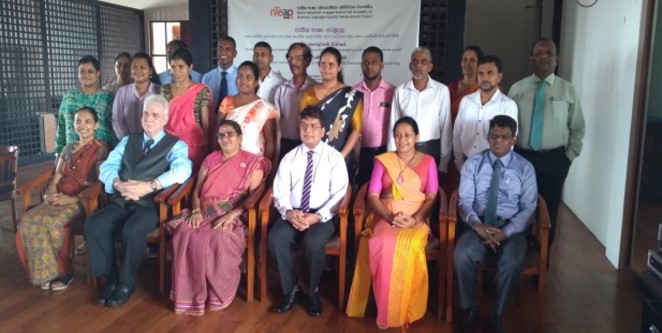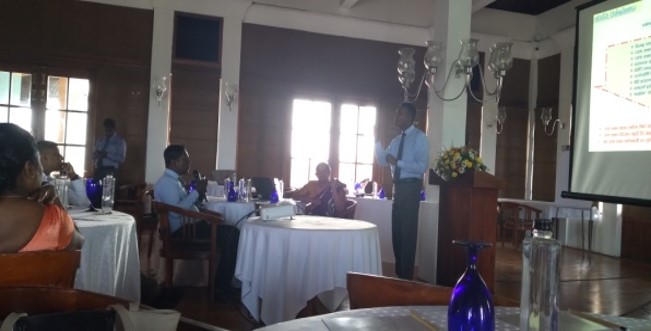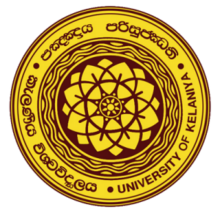Sign Language Laboratory - Ayati Centre- Services We Offer
The sign language lab attached to the Centre for Disability Studies, Department of Disability Studies, carry out the activities of the Asia Pacific Sign Linguistics Research and Training Programme (APSL programme) offered by the Centre for Sign Linguistics and Deaf Studies at Chinese University Hong Kong.
The four professionally trained team of Deaf researchers; Mr Brayan Kodithuwakku, Ms Geshani Amila, Mr Mohomad Rasak, and Ms Puboda Sarani functions at the sign language lab to organize and execute the following tasks:
- Documentation and archiving of sign language dialects of the country.
- Gaining expertise in sign language documentation and archiving.
- Teaching sign language.
The Nippon Foundation in Tokyo, Japan granted funds to develop a fully equipped lab at the Ayati centre.
Asia Pacific Sign Linguistics (APSL) Research team
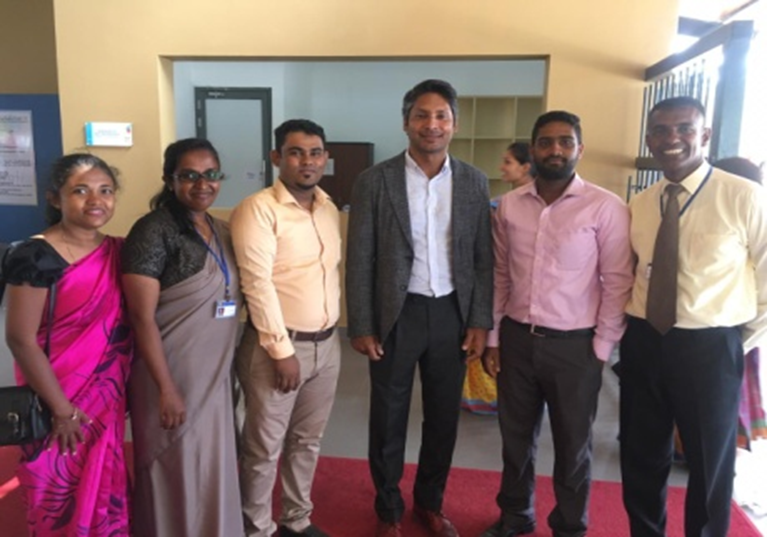
Group photo taken on the opening of Ayati building. Left to right: Pubodha Sarani, Geshani Amila, Rasak Mohammad, Kumar Sangakkara (Ayati trustee), Brian de Croos (Sign Language interpreter), Brayan Kodithuwakku.
The four APSL researchers: Brayan Kodithuwakku, Geshani Amila, Mohomad Rasak, and Puboda Sarani, are professionally trained Deaf researchers from the Asia Pacific Sign Linguistics Research and Training Programme (APSL programme) offered by the Centre for Sign Linguistics and Deaf Studies at Chinese University Hong Kong. APSL programme is a multi-phase project on developing practical dictionaries of Asia Pacific Sign Languages. The purpose of the project is to promote scientific research in sign language to overcome misconceptions about sign language that have had ramifications on deaf education in the past decades. In most parts of Asia, many Deaf individuals are not able to access higher levels of educations that restrict them to seek social advancement.
Sign Language laboratory at Ayati - National Centre of Excellence for Children with Disabilities.
The activities of the APSL programme was carried out at the Centre for Disability Studies, Department of Disability Studies from 2017. After the discussion during the consortium meeting on sign linguistic and deaf education at the Nippon Foundation headquarters in Tokyo, Japan, on the 21st and 22nd of January 2019, the Nippon Foundation granted funds to develop a fully equipped sign language lab at the Ayati centre. Since the end of 2019, the APSL team functions at the sign language lab to organize and execute the following tasks:
- Documentation and archiving of sign language dialects of the country.
- Gaining expertise in sign language documentation and archiving.
- Teaching sign language.
1. Sign Language teaching sessions/ training workshops
- Teaching Sign Language to the 35 1st year students (Batch 11) from 7th November 2019 to 15th January 2020.
- Sign Language and Sinhala Language teaching sessions were conducted for the children of below grade 5 at Rohana Special School, Matara every Saturday from January 2020 for 24 weeks. The programme got discontinued due to the pandemic.
Students of Rohana special school learning Sign Language.
- Sign Language training session was held for the social services officers, parents of children with disabilities and their children in collaboration with the Divisional Secretariat Office, Hambantota and Nawajeewana NGO, Tangalle. APSL researcher have conducted the sessions for 40 participants from 15th September 2020. The programme as planned to hold every Tuesdays for 20 days, however, it got discontinued due to the pandemic.
Officers at Department of Social Services learning Sign Language.
- Several Sign language teaching sessions were conducted for the physiotherapists at Aythi centre, in August 2020.
- Sign Language Training sessions were held for the social services officers, parents of children with disabilities and for their children in collaboration with the Divisional Secretariat Office, Galle and Nawajeewana foundation, Tangalle. APSL researchers have conducted the sessions from 14th August 2020 for 10 Fridays. Due to the pandemic situation, the programme was discontinued after 7 sessions.
Officers, parents, and children at the Sign Language learning session.
- A sign language teaching session for batch 12 students following BSc Speech and Hearing Sciences programme was conducted though zoom on 6th of July, 2020.
Conducting Sign Language teaching via zoom.
- Sign Language training sessions were conducted from 17th August 2020 for 10 Mondays for 35 social services officers, parents of children with disabilities and their children at Matara which was organized by NavaJeewana Foundation, Tangalle. Due to the pandemic, the programme got discontinued.
Officers at Department of Social Services learning Sign Language
- Sign Language training sessions were conducted from 17th August 2020 for 10 Mondays for 35 social services officers, parents of children with disabilities and their children at Matara which was organized by NavaJeewana Foundation, Tangalle. Due to the pandemic, the programme got discontinued.
2 . Research
3. Sign Bank
As a part of the APSL project, the SignBank was launched to collect and archive new signs. It is an ongoing activity where the researchers collect signs from different dialects and verify them before uploading the videos of recorded signs in the SignBank. The recording process is multifaceted where dialogues, monologues, exercises and sample sentences of each word required to be made. During the last year, PowerPoint presentations were prepared containing 300 new signs to gather data from the Deaf community.
4. Webinars
The Centre for Disability Studies (CDS) of the Department of Disability Studies and the Coordinating Centre for Students with Disabilities (CCSD) of the University of Kelaniya in collaboration with Centre for Disability Research Education and Practice (CEDREP) of the University of Colombo had a webinar series; “conversations during lockdown”. APSL researchers (Ms Geshani Amila and Mr Mohomad Rasak) were resource persons along with university students and staff in the 2nd Webinar on Locked-down but online – Looking at Covid 19 through a critical Disability Lens.
5. Discussions/ meetings/ Workshops/ forums attended
• The APSL researchers attended a program on Media Literacy for Fake News World organized by the Sri Lanka Development Journalist Forum (SDJF). This was a joint effort of SDJF with centre for Media and Information Literacy in order to make awareness among communities about misinformation and fake news.
- Mr Brayan Kodithuwakku participated at a Networking Session in July 2020 with District Officers in the National Language Fund project which was conducted by the National Office Language Department, Kandy.
Brayan addressing the audience.
- A discussion was held on researching the signs related to sexuality and reproduction on August 2020. This session was organized by the United Nations Population Fund (UNFPA).
Discussion with the representatives of UNFPA
-
Mr Brayan Kodithuwakku participated in a networking session with the district officers of the National Language Fund (NLF) under National Languages Equity Advancement project which was organized by the Department of National Languages at Galle on August 2020.
Participants and resource persons at the networking session of NLF project

